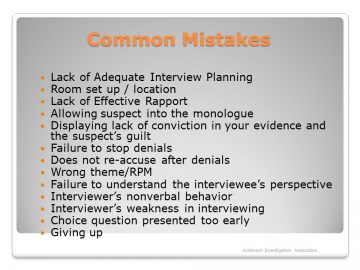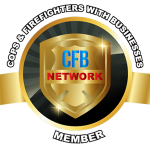
In everything in life that we work to master, there are often common mistakes that occur or creep into our practice. Interviewing is no exception. Some of these issues are oversights and some are just the result of bad habits or inadequate training. In any case, they often compromise the results that we are attempting to garner. They certainly decrease the quality and quantity of truthful information that we obtain which is our ultimate goal.
I remember, what seems like ages ago now, when I was at the FBI Academy and our primary firearms instructor said he would much rather train an agent who had never fired a gun as opposed to one who had been previously trained. His point was that it is easier to establish good habits instead of breaking bad ones. Our interview training is designed to train good habits and mitigate bad ones to facilitate more successful, complete, and productive interviews. Unfortunately, the reality is that we often are working to change already established poor practice and habits.
I see it all the time and must confess it was true for me as well. I spent years in the field doing thousands of interviews with some excellent results, but with little quality training to build credibility and confidence. Consequently, there were things I did wrong that compromised my ability to maximize information. It was only when I entered the training arena that I understood the error of my way. Okay, you say “hand up an example.” Handling denials, shutting them down, in order to prevent being distracted from my interview plan. This is a huge and frequent problem.
So, this blog is about those faux paus. We’ll call them common mistakes. It’s up to you to honestly reflect on which ones are common to you. I have established my baker’s dozen in the list, certainly not all inclusive, but enough to get you thinking and reflecting. Self-analysis is essential. I’m calling it one blog, but coming in two parts, this to allow you to focus on each item, and secondly, so my critics can’t complain that my blogs are too long.
Here’s th e list to start the processing, and then we will split the list and explore them:
e list to start the processing, and then we will split the list and explore them:
Research and practice indicate with clarity some repetitive issues that adversely affect the interview landscape. We will examine 13 of them. Hopefully, most have no ownership on your interview property, and the ones that do, you need to remove as squatters.
- Lack of adequate interview planning
Although this list is in no particular order, by occurrence and research, this is a huge one. Recent research in the interview arena and observed practice shows this as an often-neglected quantity. The number of times that interviewers have told me that they “winged” interviews is huge. And likely the results were commensurate with the investment upfront. Statistically, adequate interview preparation is occurring in 10% of all interviews. This is a very dismal statistic. Lack of planning leaves you short-changed in rapport development, question formulation, theme preparation, evidence presentation…and the list goes on. The lack handicaps you at every turn in the interview suite. General Dwight Eisenhower once said, “Plans are useless, but planning is indispensable.” It prepares us for adjusting and adapting to the eventualities of the interview.
I know we have plenty of responsibilities, investigations or audits, and ancillary duties, but we each know when an interview requires the attention to maximize the opportunity for success. When those occur, we must plan. That planning needs to be broad based; not only the issue at hand, the questions to ask, and the approach to take, but who is this person, what motivates them, and where is their Achilles heel? We must invest to succeed.
- Room set up / location
The consideration for this should occur in the planning area just discussed. We should be strategizing this for each interview reflecting on where we can maximize results. The location, the setup, who will be present, how to arrange the room, etc. should all be considered. Are we examining best practices to maximize results in all these areas? Do we consider where fruits of the crime would be present or accessible? Are we leaving barriers in the interview room, because this is what we are comfortable with? Are we allowing unnecessary participants in the interview who could adversely affect an admission? Don’t think this is too basic to consider, it is important.
- Lack of effective rapport
Another statistically significant issue. When I ask students what their interviewing strength is, a huge number indicate rapport. However, recent research identifies that adequate rapport is established in less than one in ten interviews. Adequate rapport is not talking about your local sports teams or the weather, although these can be a starting point; it is drilling down from casual rapport to close rapport to intimate rapport. It is about establishing trust and identifying commonalities to build on. We can’t expect to maximize the quality and quantity of truthful information without the accompanying development of quality rapport. Not surprisingly, quality planning can have a significant effect on the depth and breadth of rapport building. We must build rapport.
- Allowing suspect into the monologue
While executing our interview plan, after we have developed rapport and asked all relevant open-ended, assumptive, and closed questions, we must transition to the monologue or evidence presentation. Up until this point of the interview, the interviewee should be doing most of the talking, however when we transition here, the interviewer should only be talking. This is the opportunity to convince the subject that you know what they did as you work toward an admission. At this phase of the interview, the likelihood of denials increases dramatically, so minimizing interruptions is essential. I have watched many interviews where the interviewee was convinced to be quiet and attentive during the evidence presentation, and then invited into the monologue by some ill-placed question. Once you move into the monologue or evidence presentation, don’t invite the interviewee in, and be prepared to effectively deal with denials. Not doing so, can severely damage your effective interview progress. I know, surprisingly, adequate planning can minimize missteps in this area as well.
- Displaying lack of conviction in your evidence and the suspect’s guilt
Wishy washy language is not needed during the interview. Research has shown that over 60% of wrongdoers admit to what they have done because they believe the interviewer already knows it, (even if we don’t). This statistic doesn’t come into play if our language is filled with hedging and qualifiers. Please don’t misinterpret confident language as being arrogant language. There is no place for arrogance in the interview room. Planning and rehearsing our evidence presentation can have a positive effect on how we come across and instill that confidence that we must exude.
- Failure to stop denials
I already handed this up as an issue I struggled with for years. Our failure to shut down denials allows the interviewee to distract and divert from the issue at hand. It negatively affects our ability to demonstrate confidence and convince them that we know what they did. Knowing how to and handling these denials can be accomplished with minimal training and consistent practice. Knowing the difference between direct denials and reason denials is essential. Learning how to respond to questions and not necessarily answering those questions can be an invaluable skill to maximize the quality and quantity of information received.
- Does not re-accuse after denials
Connected to the previous item is the necessity after shutting down the denial to immediately re-accuse and return to themes employing rationalization, projection, and minimization, that will make it easier for the interviewee to tell the truth. We must expect denials in an interview. It is our job to work through these obstacles, put them aside, and seek the truth. More and more we are seeing interviewers face a few denials and then give up. Many will often say the evidence will prove the truth, but there is really nothing more revealing and useful than a full admission and confession, or just truthful information in an audit engagement.
In Part 2 of this Baker’s Dozen we’ll look at the rest of our motley list to include:
Wrong theme/RPM
Failure to understand the interviewee’s perspective
Interviewer’s nonverbal behavior
Interviewer’s weakness in interviewing
Choice question presented too early
Giving up
I’m certain one or more of these common faux paus have creeped into your interviewing. Next interview, get out there and eliminate one. After that, one at a time until they are all gone and watch your results improve dramatically and consistently.
Anderson Investigative Associates is positioned to custom tailor training to your specific needs. We address issues to resolve each of these common mistakes in many blocks that we instruct. If you have any questions or would like to discuss the above blog or any training need, please reach out to me. Additional issues pertaining to interviewing, auditing, and investigations can be found in other blogs that I have written and are contained in most blocks of instruction that our company presents.
If you have additional questions or comments or have a topic you would like to see covered in a blog, give me a shout. In the meantime, be well and be safe out there.
Mark A. Anderson
Director of Training and Development
Anderson Investigative Associates, llc
114 Loucks Avenue
Scottdale, PA 15683
manderson@andersoninvestigative.com
tel:912-571-6686
https://www.linkedin.com/in/mark-a-anderson-a46a1658
